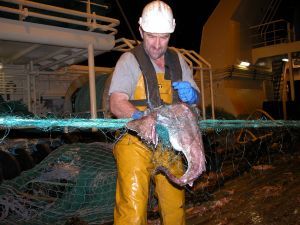
New Managing Director for Bellona Norway
The Board of the Bellona Foundation has appointed former Minister of Climate and the Environment Sveinung Rotevatn as Managing Director of Bellona No...
News

Publish date: September 27, 2005
Written by: Frederic Hauge
News
Just recently, a Norwegian expedition discovered more than 300 km of fishing nets used for ghost-fishing in the area. Fishermen in this area use between 150 and 300 km of nets and often leave them behind because they usually can not bring back both their catch and their nets.
Rotting fish
Norwegian fisherman Nils Roar Hareide recently found ghost-fishing nets during an Irish-financed expedition. Hareides expedition found 22 sets of nets between 400 and 1,200 meters deep, approximately 60 nautical miles south-east of Rockall, a small, isolated rocky islet in the North Atlantic Ocean. Each net measured between eight and 13 km, adding up to a total of 300 km. The expedition successfully pulled up some of these ghost nets and found that not all of them were marked by those fishing enterprises that left them behind.
Though mostly based in Spain, the boats laying out such long nets sail under French, British or German flags. The volume of the nets is such that it is extremely difficult to pull them up and the fishermen therefore leave some in the water. A large number of fish and crab end up rotting in the nets left behind. It is estimated that in the area of Rockall, approximately 100 tonnes of fish and crab caught in these nets end up rotting every day.
Hareide does not understand how Spanish fishermen can intentionally spoil such huge resources.
The fishermen catch 100 tonnes of fish in six weeks out here, which is a lot, said Hareide.
During his expedition, Hareide found, amongst others, large amounts of dead crab in the nets pulled up. Some ghost-fishermen do not come back for their nets for several months and Hareide spoke of one specific ship that allegedly left its nets in the water for up to four months.
This is scandalous, says Bellona President Frederic Hauge. These fishing nets must simply be pulled out of the sea—this can not become a question of financial resources. Constant patrolling of the areas where ghost-fishing is a problem is a must in order to stop this madness.
A new UK-financed expedition, also lead by Hareide, will soon head out to continue the work of finding such nets on a vessel called the India Rose.
Norwegian pressure on the EU
The Fishboat Owners Association in Norway has put pressure on the EU to review and update its laws. As a result, the DeepNet project, involving partners from Norway, the UK and Ireland was set up. Pat Gallagher, Irelands marine minister, confirms that a retrieval system to remove some of the lost fising gear may be developed as a pilot project by the EU and Norway. Bellona is hopeful that concrete action will be taken at the EU level and will continue to actively work on this issue.

The Board of the Bellona Foundation has appointed former Minister of Climate and the Environment Sveinung Rotevatn as Managing Director of Bellona No...

Økokrim, Norway’s authority for investigating and prosecuting economic and environmental crime, has imposed a record fine on Equinor following a comp...

Our op-ed originally appeared in The Moscow Times. For more than three decades, Russia has been burdened with the remains of the Soviet ...

The United Nation’s COP30 global climate negotiations in Belém, Brazil ended this weekend with a watered-down resolution that failed to halt deforest...